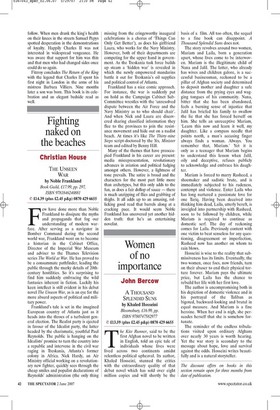Women of no importance
John Bercow A THOUSAND SPLENDID SUNS by Khaled Hosseini Bloomsbury, £16.99, pp. ISBN 9780747582977 £13.59 (plus £2.45 p&p) 0870 429 6655 The Kite Runner, said to be the first Afghan novel to be written in English, told an epic tale of individuals whose lives were lived across two continents amidst relentless political upheaval. Its author, Khaled Hosseini, stunned the critics with the extraordinary quality of that debut novel which has sold over eight million copies and will shortly be the basis of a film. All too often, the sequel to a fine book can disappoint. A Thousand Splendid Suns does not.
The story revolves around two women, Mariam and Laila, born a generation apart, whose lives come to be interwoven. Mariam is the illegitimate child of Nana and Jail The latter, who already has wives and children galore, is a successful businessman, reckoned to be a pillar of Afghan society and determined to deposit mother and daughter a safe distance from the prying eyes and wagging tongues of his community. Nana, bitter that she has been abandoned, feels a burning sense of injustice that Jalil has briefed his family to swallow the lie that she has forced herself on him. She tells an unreceptive Mariam, 'Learn this now and learn it well, my daughter. Like a compass needle that points north, a man's accusing finger always finds a woman. Always. You remember that, Mariam.' Yet it is only as a teenager that Mariam begins to understand this lesson when Jalil, oily and deceptive, refuses publicly to acknowledge and embrace his daughter.
Mariam is forced to marry Rasheed, a shoemaker and sadistic brute, and is immediately subjected to his rudeness, contempt and violence. Enter Laila who has long nurtured a passionate love for one Tariq. Having been deceived into thinking him dead, Laila, utterly bereft, is inveigled into partnership with Rasheed, soon to be followed by children, while Mariam is required to continue as domestic serf. The day of reckoning comes for Laila. Previously content with one victim to beat senseless for any questioning, disagreement or imperfection, Rasheed now has another on whom to rain blows.
Hosseini is wise to the reality that submissiveness has its limits. Eventually, the two women, once foes, now friends, turn on their abuser to end their physical torture forever. Mariam pays the ultimate price, but Laila has the chance to rebuild her life with her first love.
The author is uncompromising both in his depiction of domestic violence and in his portrayal of the Talib an as bigoted, backward-looking and brutal in equal measure. And Mariam is a fine heroine. When her end is nigh, she persuades herself that she is somehow fortunate.
The reminder of the endless tribulations visited upon ordinary Afghans over nearly 30 years is worth hearing. Yet the war story is secondary to the message about hope, love and survival against the odds. Hosseini writes beautifully and is a natural storyteller.
The discount offers on books in this section remain open for three months from date of publication.




















































 Previous page
Previous page